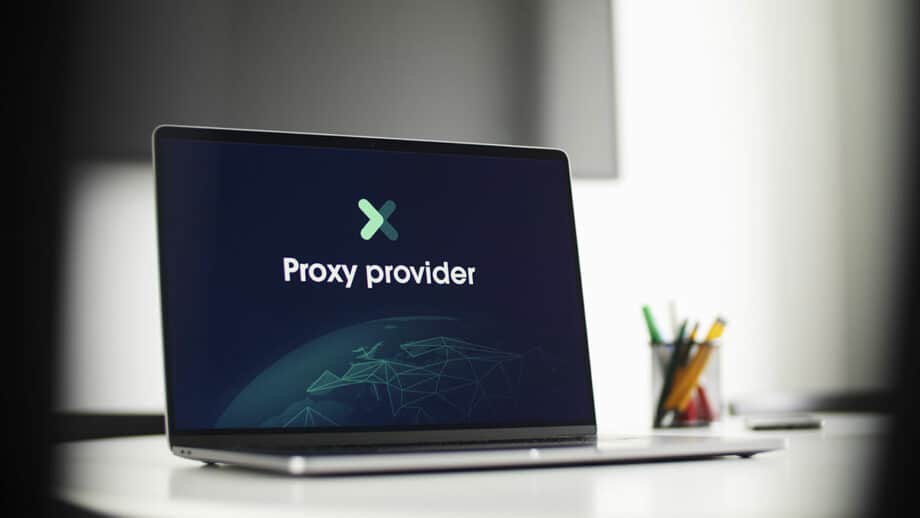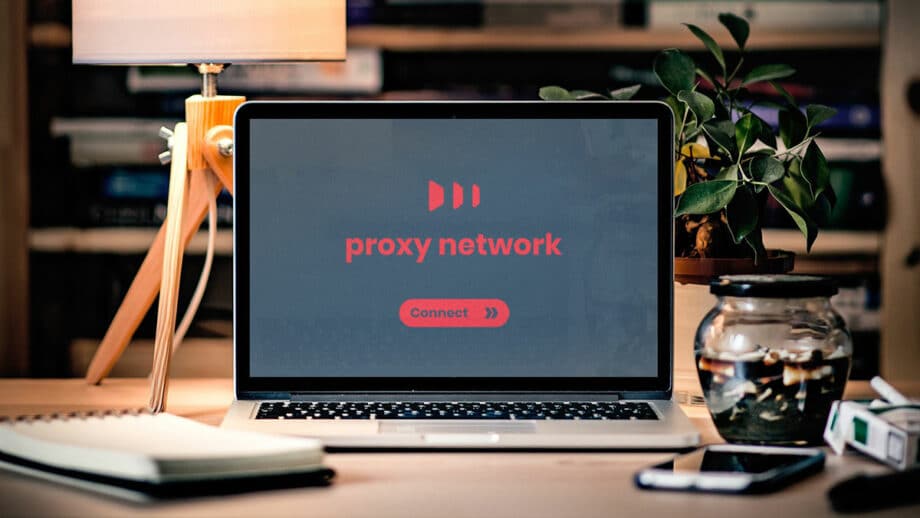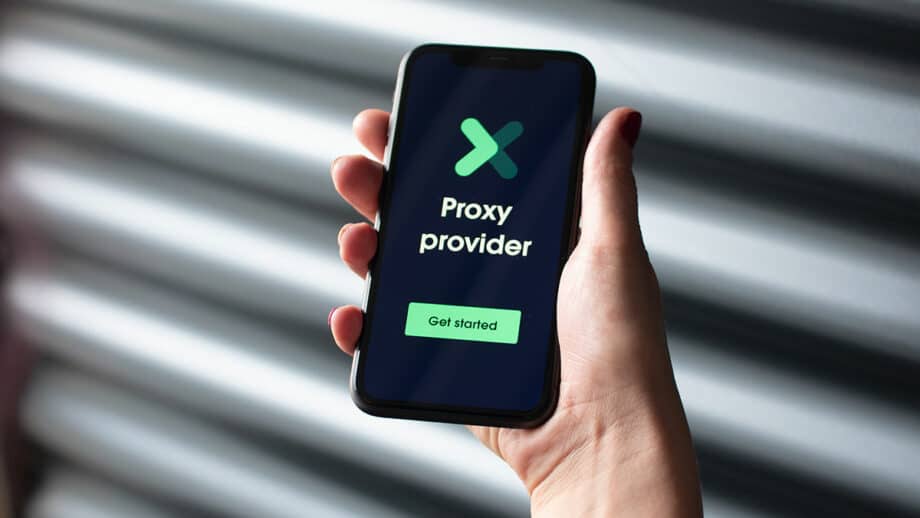Have you ever clicked a site, only to find it blocked or super slow? Or maybe you’re worried about sharing personal data on the web? Who isn’t? A proxy server can help protect your online privacy by hiding your IP address and keeping snoopers away from private details like passwords or browsing history.
In this post, I’ll clearly explain how proxy servers work – the advantages they bring, along with certain drawbacks. Keep reading to learn if using a proxy would make sense for you.
What is a Proxy Server?

A proxy server sits between your computer and the internet. It’s like a gatekeeper or “middleman” that checks data traffic passing through. Proxy servers have their own IP address, different from your device’s IP, so websites don’t see your real location – making anonymous browsing easy (great news for privacy fans!).
They can also act as firewalls or filters, managing what web traffic enters or leaves a network to boost user privacy and online security. You might set one up on Chrome, Firefox, Safari – or even at work – to control access and keep harmful websites away.
How Proxy Server Works?
Imagine you’re surfing the web and your HTTP requests go straight to a website’s server – then imagine adding a middleman (yup, that’s your proxy). With this setup, all incoming and outgoing web traffic goes through that “middleman,” shielding your IP address from direct contact with other servers.
You Without a Proxy Server

“Browsing without a shield is surfing in muddy waters; you never know what’s watching below.”Fortinet
When I surf the web without a proxy server, my connection is direct to websites like regular users. My IP address acts as my ID card – exposing where I am through my approximate location.
Websites can see browser details, cookies I’ve saved, and even operating system data including plugins. With no “middle man,” this open pathway leaves me at risk of harmful sites or cyber attacks since some page requests and transfers lack encryption.
Using an unsecured link has given rise to unsettling situations personally – I once clicked on a bad site by mistake (oops), only to find suspicious ads trailing me for days due to tracking cookies left behind during that visit! Without proxies, browsing becomes less private and far more vulnerable online.
You With a Proxy Server

“Proxies add structure and insulation to distributed systems, acting as a mediator between your computer or device and the Internet. The proxy server acts on behalf of you while making requests to websites, services, etc., disguising your IP address with that of their own. This way they provide an extra layer of security whilst maintaining anonymity online.”Dummies
With a proxy server, your IP address stays hidden behind the proxy’s own IP. This helps keep your online identity anonymous and protects your personal data from hackers looking to steal it.
Proxy servers like forward proxies or residential proxies let you access “geo-restricted content” – those pesky videos limited by country or location – and bypass web filters on restricted networks at school or work (just don’t tell your teacher!).
Proxy servers also make browsing safer by filtering out malware risks before they reach you. An HTTP proxy can speed up internet loading times through caching, which means visited pages come up faster next time around – saving bandwidth and cutting costs for users with data limits.
By using an HTTPS proxy, you add another layer of security to help ensure private info stays private when logging into apps or sending emails over SMTP (Simple Mail Transfer Protocol).
For users seeking enhanced anonymity and security when managing multiple online identities or accounts, an antidetect browser like Multilogin can complement proxy servers. By creating unique browser environments, an antidetect browser minimizes the risk of detection and helps maintain a seamless, secure online presence.
“Protecting your digital identity and security is of the utmost importance in today’s online world. Utilizing a proxy server can be an effective solution for preventing third parties from tampering with or hacking into your data while you browse the internet, making it both easy to use and highly secure.”William Weiss, the founder of Proxy Solutions
What are the Different Types of Proxy Servers?

Proxy servers come in many types; each one made for different uses. Here’s a clear list of the main proxy types you’ll find online today:
- Forward Proxy: A forward proxy hides your IP address by acting as a middleman – it takes web requests from your computer and sends them to the web server on your behalf, keeping you private and safe.
- Reverse Proxy: Reverse proxies protect web servers by handling client requests; they improve security, speed up web traffic through caching, and help with load balancing.
- Transparent Proxy: This type doesn’t hide your original IP address (not good if privacy is your aim), but many networks use it to monitor activity or do basic content filtering without users knowing they’re there at all.
- Anonymous Proxy: An anonymous proxy hides your real IP address from websites, giving you added online privacy while surfing sites that might track or log visitor info.
- High Anonymity Proxy (Elite Proxy): Elite proxies offer maximum protection – they completely hide both your actual IP and the fact you’re using a proxy at all – perfect for serious online privacy needs or sensitive projects like web scraping tasks.
- Distorting Proxy: This one’s unusual – your real IP gets hidden, but it provides websites with “fake” details about where you’re located; it’s helpful for accessing geo-restricted content or bypassing local censorship rules.
- Residential Proxy: Residential proxies use genuine home-based IP addresses issued by Internet Service Providers (ISPs), making them less likely to get blocked when used for data scraping projects or accessing geo-restricted platforms like streaming services abroad – it worked wonderfully for me last summer when Netflix had shown unavailable in my country!
- Datacenter Proxy: Datacenter proxies provide fast connections hosted inside data centers – but they’re easier for sites to spot compared to residential ones; still handy if you need speed more than stealth.
- Public Proxy: These free options are easy grab-and-go solutions widely available online; though appealingly cost-free (who doesn’t love free?), they’re often slow due to heavy traffic loads and pose risks from hackers lurking and snooping around unsecured connection points.
- Private Proxy (Dedicated Proxy): Private proxies serve just one user at once, offering better security plus reliable speeds for sensitive tasks like secure transactions or email security – it’s like having the whole highway lane reserved just for yourself!
- SSL Proxy (HTTPS Proxy): SSL proxies handle encrypted communication between clients and servers over HTTPS – they help access secure websites safely but sometimes come slower since encryption takes processing power along the way.
- SOCKS Proxy (SOCKS5): SOCKS5 Proxies work well beyond simple HTTP requests – they can route various internet data types including FTP transfers or email messages sent via email clients using IMAP protocols – making these versatile helpers especially useful across multiple apps needing connectivity support through firewalls!
7 Advantages of Using a Proxy Server

Using a proxy server can boost your online privacy, speed up web traffic through caching, and even help you access blocked content – there are plenty of neat perks (and you’ll definitely want to stick around to learn more).
1. Enhanced Privacy and Anonymity
“Imagine browsing without borders, where every site welcomes you without question. Anonymity is your passport to a limitless online world.”Proxy Review Hub
Proxy servers hide your real IP address from the websites you visit. High anonymity proxies can fully mask who or where you are, giving complete privacy online. So next time you’re shopping or streaming videos, websites can’t track your moves and habits (“goodbye creepy ads!”).
Anonymous proxies protect personal data well – keeping hackers away from private info on computers and phones.
I recently tried a proxy server myself (just to see how it works), and I found location-specific shows unlocked instantly. By hiding my true geographic spot, I could finally watch content that’s usually blocked in my area – which was pretty great for binge-watching weekends! Browsing privately felt good too; not worrying about tracking cookies made web surfing a much more pleasant ride overall.
2. Improved Security and Access Control
Using a proxy server boosts your network security in a simple way – it hides your real IP address. This makes it harder for hackers to track you online. Companies often rely on secure web gateways or proxies to block harmful websites and malware, keeping their private networks safe from threats.
At my last job, the IT team used reverse proxies to limit access only to trusted sites. They also kept detailed logs of all web requests – this helped them quickly spot when someone tried going where they shouldn’t (like that coworker who kept getting caught using social media at work).
Using these proxy servers with built-in content filtering tools helps companies protect sensitive data from leaking into the wrong hands.
3. Faster Internet Performance Through Caching
Proxy servers can speed up your internet. They store copies (“cached” versions) of websites you often visit. For example, say you check the news every morning; a proxy will save that page after the first visit.
So next time, it loads faster since it’s already stored and ready to go (pretty neat, right?). Proxy caching cuts down on bandwidth use and improves network performance by easing traffic flow.
This helps reduce load times for web pages you use frequently. I tried this myself – the difference was clear when loading heavy sites full of pictures or videos! Caching is a common tool used in computer networks and forward proxies to make browsing quicker and easier for everyone involved.

4. Bypassing Geo-Restrictions and Censorship
Have you ever clicked a video, and then seen the words “content blocked in your region”? It’s pretty annoying (been there myself many times). With an anonymous proxy server, you can mask your IP address.
This makes websites believe you’re browsing from somewhere else. So, if Netflix blocks a movie in the U.S., routing web traffic through an HTTP proxy located in another country gives quick access to that film (tried that myself – worked great with BBC shows!).
Governments or workplaces might also censor content they don’t want users seeing – but by using rotating proxies or SOCKS proxies, users easily slip past these limits and view censored pages without trouble.
5. Corporate Network Management and Monitoring
“With every byte passing through its watchful eye, the proxy server ensures seamless browsing and cost-effective bandwidth use. It’s the quiet workhorse in a bustling corporate stable.”Cisco
Proxy servers help big companies manage their networks. They track what workers view online (“no more cat videos at work,” says your boss, smiling). Content filtering makes sure everyone sticks to company rules about internet use.
Corporate proxies also boost network performance by caching popular web pages. This lowers traffic and bandwidth costs for the organization.
Network teams rely on proxy servers as secure web gateways. These proxies block dangerous websites loaded with malware (which once crashed my computer, no joke!). Admins can also watch web traffic closely using proxy server configuration tools like forward or reverse proxies.
Anonymous proxy services hide IP addresses for safer browsing across corporate systems. All these things keep business networks safe and smooth-running – making IT folks breathe much easier!
6. Better Load Management and Traffic Balancing
Imagine your favorite shopping site on Black Friday – tons of people want the best deals. Without smart load balancing, it crashes fast (and we all get upset). Reverse proxy servers step in here – they take many client requests and spread them out evenly to backend web servers.
Smart ways like “round robin,” which sends each new user request to the next server in line, or “least connections,” picking the least busy one, make sure no single server has too much load.
I once built a simple website that got super popular overnight (“crazy right?”). My poor little networked computer couldn’t handle all those web traffic hits at once – a classic overload issue.
Setting up a reverse proxy saved me – it split visitor requests between multiple backup machines using IP hash methods (checking IP addresses), keeping my humble online shop live, humming along smoothly without freezing or crashing – that’s better load management in action!
7. Cost-Efficient Bandwidth Usage
Proxy servers save you cash by cutting bandwidth use. They store copies of sites and files you often visit (“caching”). This means less load on your network, so pages open faster without eating more data.
A good proxy server configuration helps manage web traffic to reduce delays (“latency”) while boosting network performance.
Plus, proxies let users reach geo-restricted content without extra charges or higher data use. So, an HTTP proxy or HTTPS proxy gets past blocks that limit access based on IP addresses – no need for costly VPNs or free proxies with slow speeds and security issues (yikes).
Just be sure the resources of your chosen proxy are well-managed to stay speedy and efficient.
7 Disadvantages of Using a Proxy Server

Sure, proxy servers can be handy – but they’re not perfect (nothing really is). Before you jump onto that free HTTP or SOCKS proxy thinking it’ll solve your privacy worries… there are some risks you’ll want to know about first.
1. Potential Security Vulnerabilities
“Your data is your treasure; don’t leave it unguarded. Choose wisely, and protect what’s yours with trusted security.”Toptal
Free proxies may look great (“who doesn’t love free stuff?”), but they can put your online security at risk. These servers often lack strong protection, so hackers easily target user data through gaps in the system.
Worse yet, proxy owners might log details of your browsing history and IP address. Such logs pose big threats to online privacy – your personal info might get shared or sold without you knowing it.
Many proxies don’t have encryption (which means they send data openly), leaving you exposed while using them for web traffic or file transfer protocol (FTP) servers. Data like usernames, passwords, and banking details could become easy prey for hackers if sent unprotected over HTTP proxies.
Even an HTTPS proxy isn’t always secure; some still fail to hide sensitive content from prying eyes (“kind of defeats the purpose, right?”). So think twice before trusting free services with your important private information.
2. Lack of Encryption in Some Proxies
Encryption is key for online security – yet some proxy servers don’t have this feature. Without encryption, your IP address and web traffic are exposed to risks like hacking, viruses, or malware.
Malicious actors can easily intercept data from unencrypted HTTP proxies and transparent proxies. Confidentiality might seem secure through anonymous proxies or distorting proxies – but their weak encryption leaves user data open to attacks.
Data protection suffers greatly if the chosen proxy server lacks strong Secure Socket Layers (SSL). Your personal details could fall into the wrong hands—as hackers often target unsecured network connections.
Without proper HTTPS proxies in place (Hypertext Transfer Protocol Secure), private information stays vulnerable on the internet message access protocol servers as well as post office protocol and FTP servers.
Keep a close eye on each proxy server configuration for better online privacy (and fewer sleepless nights about who sees your stuff!).
3. Decreased Speed and Performance
Proxy servers can slow down your network performance. These servers sit between you and the web, so they take extra time to process web traffic. This delay adds up fast if the proxy server is far from you, causing increased latency (no one likes that annoying lag).
And a free proxy? Oh boy – these are often overloaded, meaning too many users cause them to run even slower.
An overloaded forward proxy or transparent proxy might leave you staring at loading screens for ages. Sites with heavy images or videos load especially slowly through crowded proxies (forget streaming your favorite geo-restricted content smoothly).
So yes – you save money on bandwidth usage – but brace yourself for slower speeds and weaker internet performance overall.

4. Limited Functionality with HTTPS Websites
HTTPS sites often don’t play well with certain proxy servers. These secure websites use encrypted web traffic, and some proxies can’t handle that. Users might see errors or blocked pages on HTTPS sites due to issues in the proxy server configuration.
Even a transparent proxy server – a common type – sometimes has trouble accessing secure content from banks or online stores.
Also, an HTTP proxy doesn’t encrypt your data stream like a virtual private network (VPN) would. Because of this lack of encryption, HTTPS websites may refuse connections coming from such proxies for security reasons.
This can be tough if you’re trying to get around geo-restricted content or censorship on these protected sites – it simply won’t work as planned!
5. Legal and Ethical Concerns
“In a world where information is power, consider the implications of who holds yours. Choose your digital gatekeepers wisely; your privacy is too precious to gamble.”IEEE
Using proxy servers can raise some legal problems. For example, bypassing geo-restricted content may break the rules of certain websites. Sites like Netflix clearly state in their terms of service that getting around location blocks isn’t allowed (“oops!”).
Ethical issues also exist – especially with free proxies. Free HTTP proxies might log your IP address and browsing history to collect sensitive information for profit or ads (yikes!).
This means online privacy and data protection could be at risk if you pick a shady provider. So always check the trust level of any anonymous proxy before hooking it up – your personal info, after all, is worth more than saving a few bucks on bandwidth costs.
6. Dependence on Proxy Server Availability
Proxy servers can go offline, and it happens more than you think. Last week I was web scraping some sites through a forward proxy when suddenly – bam! No connection. Turns out, the proxy server was down.
If your IP address depends on them to access sites or bypass geo-restricted content, you’ll likely lose internet access until they’re back online.
This downtime gets worse for businesses that rely on constant network performance through proxies like reverse proxies or rotating proxies (those servers rotate IP addresses). Outages mean trouble: work stops, tasks pile up, and stress kicks in pretty fast.
Your plan B better be ready – maybe consider having a backup proxy setup or even a Virtual Private Network (VPN) as another option just in case things go south.
7. False Sense of Security
A proxy server can make you feel safe – but that may not be real. Free proxies often have weak security, leaving your IP address and web traffic open to malware or data breaches (yikes!).
An HTTP proxy without encryption might expose sensitive details like passwords or private messages; I learned this the hard way when using an unsecured transparent proxy a few years ago.
Some companies offering anonymous proxies still keep logs of your online behavior, even if they claim you’re hidden. Just because you’ve enabled a high anonymity proxy doesn’t mean your online privacy is fully protected – you can still face risks from hackers or snooping eyes.
Even worse, tools like rotating proxies might give users confidence they’re always secure but don’t guarantee full protection against data logging by providers behind the scenes.
Choosing the Right Proxy Server

Picking the right proxy server depends on your needs for privacy and security. If hiding your IP address is key, choose a high anonymity proxy like TOR. This type stops websites from tracking you or seeing your online activity clearly.
But if the goal is just to get around geo-restricted content (like watching shows only available in other countries), an anonymous HTTP proxy might be enough.
Free proxies sound good – who doesn’t like saving money? Still, they come with trade-offs like slower speeds and weaker online security. Paid services offer better speed, stronger encryption, clear logging policies (“we don’t track your data”), and solid customer support.
Think first about what matters most: cost savings, reliable data protection, or faster network performance.
Best Practices for Proxy Server Usage
“Think of a firewall and antivirus as your online Avengers team-up. With proxies, they create a super squad to keep your data safe from villains!”TechTarget
Proxy servers are great tools for online privacy. But to use them safely, follow some simple rules.
- Always choose paid proxy services instead of free ones – free HTTP proxies often lack good security, leaving your IP address open to threats.
- Check if your proxy server uses encryption (HTTPS proxy or SOCKS proxy) because plain HTTP proxies can leak your private data.
- Regularly update your proxy server configuration; outdated settings can slow down network performance and allow malware infections.
- Set up a firewall and antivirus software along with your proxy server – VPNs, firewalls, and antivirus programs add extra levels of online security beyond proxies alone.
- Follow laws about web scraping and accessing geo-restricted content; using proxies has legal limits that you must respect (“better safe than sorry”).
- Monitor how well your chosen rotating proxies perform because overloaded servers lower browsing speeds and affect internet connection quality badly (I’ve learned this through trial and error).
- Test anonymous proxies before regular use to make sure they’re really hiding your identity; not all high anonymity proxy services offer true protection from tracking.
- Avoid shared forwarding proxies – they might seem cost-effective but sharing servers with other people can risk data protection and let attackers see sensitive web traffic details.
Conclusion

“When looking for an extra layer of security and anonymity, a proxy server can be the perfect solution. But it’s important to remember that proxies must decode your traffic in order to send it through. This means they could have access to everything you do unless using SSL connections is part of your protocol. Thus, trustworthiness should always be top of mind when considering which proxy suits you best.”TechRepublic
Balancing the good and bad sides of using a proxy helps you choose wisely for personal or business needs. Smart use of proxies can boost online privacy, speed up web traffic loading, and protect your network from hacking.
Yet keeping an eye on possible security issues – like hidden malware – is just as essential to stay safe online. Always select reliable paid services over risky free ones to avoid trouble with legal concerns or slow speeds (“free” is often too good to be true!).
As cyber threats grow tougher each year, expect proxy technology to advance and play a bigger role in data protection and content filtering. Your safety matters deeply, so pick carefully – and stay ahead of “bad guys.





